- Home
- Leo Tolstoy
Collected Shorter Fiction, Volume 2
Collected Shorter Fiction, Volume 2 Read online
Collected Shorter Fiction, Volume 2
Leo Tolstoy
• LEO •
TOLSTOY
COLLECTED
SHORTER
FICTION
(in two volumes)
Written over a period of more than half a century, these stories reflect every aspect of Tolstoy’s art and personality. They cover his experiences as a soldier in the Caucasus, his married life, his passionate interest in the peasantry, his cult of truth and simplicity, and, above all, his growing preoccupation with religion. Ranging in scope from novellas like The Kreutzer Sonata and Hadji Murad to folk-tales only a few pages long, they provide a marvelous opportunity to become closely acquainted with Russia’s great novelist. Aylmer and Louise Maude’s classic translations are supplemented by new translations by Nigel J. Cooper of six stories, including two that have never before appeared in English.
EVERYMAN’S LIBRARY
EVERYMAN,
I WILL GO WITH THEE,
AND BE THY GUIDE,
IN THY MOST NEED
TO GO BY THY SIDE
THIS IS A BORZOI BOOK
PUBLISHED BY ALFRED A. KNOPF
First included in Everyman’s Library, 2001
Introduction, Bibliography and Chronology Copyright © 2001
by Everyman’s Library
Translations in the Appendix Copyright © 2001 by Nigel J. Cooper
Sixth printing (US)
All rights reserved. Published in the United States by Alfred A. Knopf,
a division of Random House, Inc., New York, and in Canada by
Random House of Canada Limited, Toronto. Distributed by Random
House, Inc., New York. Published in the United Kingdom by
Everyman’s Library, Northburgh House, 10 Northburgh Street,
London EC1V0AT, and distributed by Random House (UK) Ltd.
US website: www.randomhouse.com/everymans
A CIP catalogue reference for this book is available from the
British Library
Library of Congress Cataloging-in-Publication Data
Tolstoy, Leo, graf, 1828–1910.
[Short stories. English. Selections]
The collected shorter fiction/Leo Tolstoy; translated by Aylmer Maude
and Nigel J. Cooper; with an introduction by John Bayley.
p. cm.
eISBN: 978-0-307-81991-8
1. Tolstoy, Leo, graf, 1828-1910—Translations into English.
I. Maude, Aylmer, 1858–1938. II. Cooper, Nigel J. III. Title.
PG3366.A13 M3 2001 00-053487
891.73’3—dc21
v3.1
CONTENTS OF VOLUME 2
——
Cover
About the Author
Title Page
Copyright
A Spark Neglected Burns the House (1885)
Two Old Men (1885)
Where Love is, God is (1885)
The Story of Iván the Fool (1885)
Stories Written to Pictures (1885)
Evil Allures, but Good Endures
Little Girls Wiser than Men
Ilyás
The Death of Iván Ilých (1886)
The Three Hermits (1886)
The Imp and the Crust (1886)
How Much Land Does a Man Need? (1886)
A Grain as Big as a Hen’s Egg (1886)
The Godson (1886)
The Repentant Sinner (1886)
The Kreutzer Sonata (1889)
Appendix to The Kreutzer Sonata
The Devil (1890)
Father Sergius (1890–98)
The Empty Drum (1891)
Françoise (1892)
A Talk Among Leisured People (1893)
Walk in the Light While There is Light (1893)
The Coffee-House of Surat (1893)
Master and Man (1895)
Too Dear! (1897)
Hadji Murád (1896–1904)
Stories Given to Aid the Persecuted Jews:
Esarhaddon, King of Assyria (1903)
Work, Death and Sickness (1903)
Three Questions (1903)
Fëdor Kuzmích (1905)
Appendix 1: Two Early Stories
Preface
A History of Yesterday (1851)
A Christmas Night (1853)
Appendix 2: Four Late Stories
Preface
After the Ball (1903)
The Forged Coupon (1904)
Alyosha Gorshok (1905)
What For? (1906)
About the Translators
About the Introducer
John Bayley’s introduction and Tolstoy’s shorter fiction 1852–84 appear in Volume 1.
A SPARK NEGLECTED
BURNS THE HOUSE
‘THEN came Peter, and said to him, Lord, how oft shall my brother sin against me, and I forgive him? until seven times? Jesus saith unto him, I say not unto thee, Until seven times; but, Until seventy times seven. Therefore is the kingdom of heaven likened unto a certain king, which would make a reckoning with his servants. And when he had begun to reckon, one was brought unto him, which owed him ten thousand talents. But forasmuch as he had not wherewith to pay, his lord commanded him to be sold, and his wife, and children, and all that he had, and payment to be made. The servant therefore fell down and worshipped him, saying, Lord, have patience with me, and I will pay thee all. And the lord of that servant, being moved with compassion, released him, and forgave him the debt. But that servant went out, and found one of his fellow-servants, which owed him a hundred pence; and he laid hold on him, and took him by the throat, saying, Pay what thou owest. So his fellow-servant fell down and besought him, saying, Have patience with me, and I will pay thee. And he would not: but went and cast him into prison, till he should pay that which was due. So when his fellow-servants saw what was done, they were exceeding sorry, and came and told unto their lord all that was done. Then his lord called him unto him, and saith to him, Thou wicked servant, I forgave thee all that debt, because thou besoughtest me: shouldest not thou also have had mercy on thy fellow-servant, even as I had mercy on thee? And his lord was wroth, and delivered him to the tormentors, till he should pay all that was due. So shall also my heavenly Father do unto you, if ye forgive not every one his brother from your hearts.’ – Matt. xviii. 21–35.
THERE once lived in a village a peasant named Iván Stcherbakóf. He was comfortably off, in the prime of life, the best worker in the village, and had three sons all able to work. The eldest was married, the second about to marry, and the third was a big lad who could mind the horses and was already beginning to plough. Iván’s wife was an able and thrifty woman, and they were fortunate in having a quiet, hardworking daughter-in-law. There was nothing to prevent Iván and his family from living happily. They had only one idle mouth to feed; that was Iván’s old father, who suffered from asthma and had been lying ill on the top of the brick oven for seven years. Iván had all he needed: three horses and a colt, a cow with a calf, and fifteen sheep. The women made all the clothing for the family, besides helping in the fields, and the men tilled the land. They always had grain enough of their own to last over beyond the next harvest, and sold enough oats to pay the taxes and meet their other needs. So Iván and his children might have lived quite comfortably had it not been for a feud between him and his next-door neighbour, Limping Gabriel, the son of Gordéy Ivánof.
As long as old Gordéy was alive and Iván’s father was still able to manage the household, the peasants lived as neighbours should. If the women of either house happened to want a sieve or a tub, or the men required a sack, or if a cart-wheel got broken and could not be mended at once, they used to send to the other
house, and helped each other in neighbourly fashion. When a calf strayed into the neighbour’s threshing-ground they would just drive it out, and only say, ‘Don’t let it get in again; our grain is lying there.’ And such things as locking up the barns and outhouses, hiding things from one another, or backbiting were never thought of in those days.
That was in the fathers’ time. When the sons came to be at the head of the families, everything changed.
It all began about a trifle.
Iván’s daughter-in-law had a hen that began laying rather early in the season, and she started collecting its eggs for Easter. Every day she went to the cart-shed, and found an egg in the cart; but one day the hen, probably frightened by the children, flew across the fence into the neighbour’s yard and laid its egg there. The woman heard the cackling, but said to herself: ‘I have no time now; I must tidy up for Sunday. I’ll fetch the egg later on.’ In the evening she went to the cart, but found no egg there. She went and asked her mother-in-law and brother-in-law whether they had taken the egg. ‘No,’ they had not; but her youngest brother-in-law, Tarás, said: ‘Your Biddy laid its egg in the neighbour’s yard. It was there she was cackling, and she flew back across the fence from there.’
The woman went and looked at the hen. There she was on the perch with the other birds, her eyes just closing ready to go to sleep. The woman wished she could have asked the hen and got an answer from her.
Then she went to the neighbour’s, and Gabriel’s mother came out to meet her.
‘What do you want, young woman?’
‘Why, Granny, you see, my hen flew across this morning. Did she not lay an egg here?’
‘We never saw anything of it. The Lord be thanked, our own hens started laying long ago. We collect our own eggs and have no need of other people’s! And we don’t go looking for eggs in other people’s yards, lass!’
The young woman was offended, and said more than she should have done. Her neighbour answered back with interest, and the women began abusing each other. Iván’s wife, who had been to fetch water, happening to pass just then, joined in too. Gabriel’s wife rushed out, and began reproaching the young woman with things that had really happened and with other things that never had happened at all. Then a general uproar commenced, all shouting at once, trying to get out two words at a time, and not choice words either.
‘You’re this!’ and ‘You’re that!’ ‘You’re a thief!’ and ‘You’re a slut!’ and ‘You’re starving your old father-in-law to death!’ and ‘You’re a good-for-nothing!’ and so on.
‘And you’ve made a hole in the sieve I lent you, you jade! And it’s our yoke you’re carrying your pails on – you just give back our yoke!’
Then they caught hold of the yoke, and spilt the water, snatched off one another’s shawls, and began fighting. Gabriel, returning from the fields, stopped to take his wife’s part. Out rushed Iván and his son, and joined in with the rest. Iván was a strong fellow; he scattered the whole lot of them, and pulled a handful of hair out of Gabriel’s beard. People came to see what was the matter, and the fighters were separated with difficulty.
That was how it all began.
Gabriel wrapped the hair torn from his beard in a paper, and went to the District Court to have the law on Iván. ‘I didn’t grow my beard,’ said he, ‘for pockmarked Iván to pull it out!’ And his wife went bragging to the neighbours, saying they’d have Iván condemned and sent to Siberia. And so the feud grew.
The old man, from where he lay on the top of the oven, tried from the very first to persuade them to make peace, but they would not listen. He told them, ‘It’s a stupid thing you are after, children, picking quarrels about such a paltry matter. Just think! The whole thing began about an egg. The children may have taken it – well, what matter? What’s the value of one egg? God sends enough for all! And suppose your neighbour did say an unkind word – put it right; show her how to say a better one! If there has been a fight – well, such things will happen; we’re all sinners, but make it up, and let there be an end of it! If you nurse your anger it will be worse for you yourselves.’
But the younger folk would not listen to the old man. They thought his words were mere senseless dotage. Iván would not humble himself before his neighbour.
‘I never pulled his beard,’ he said, ‘he pulled the hair out himself. But his son has burst all the fastenings on my shirt, and torn it.… Look at it!’
And Iván also went to law. They were tried by the Justice of the Peace and by the District Court. While all this was going on, the coupling-pin of Gabriel’s cart disappeared. Gabriel’s womenfolk accused Iván’s son of having taken it. They said: ‘We saw him in the night go past our window, towards the cart; and a neighbour says he saw him at the pub, offering the pin to the landlord.’
So they went to law about that. And at home not a day passed without a quarrel or even a fight. The children, too, abused one another, having learnt to do so from their elders; and when the women happened to meet by the river-side, where they went to rinse the clothes, their arms did not do as much wringing as their tongues did nagging, and every word was a bad one.
At first the peasants only slandered one another; but afterwards they began in real earnest to snatch anything that lay handy, and the children followed their example. Life became harder and harder for them. Iván Stcherbakóf and Limping Gabriel kept suing one another at the Village Assembly, and at the District Court, and before the Justice of the Peace, until all the judges were tired of them. Now Gabriel got Iván fined or imprisoned; then Iván did as much to Gabriel; and the more they spited each other the angrier they grew – like dogs that attack one another and get more and more furious the longer they fight. You strike one dog from behind, and it thinks it’s the other dog biting him, and gets still fiercer. So these peasants: they went to law, and one or other of them was fined or locked up, but that only made them more and more angry with each other. ‘Wait a bit,’ they said, ‘and I’ll make you pay for it.’ And so it went on for six years. Only the old man lying on the top of the oven kept telling them again and again: ‘Children, what are you doing? Stop all this paying back; keep to your work, and don’t bear malice – it will be better for you. The more you bear malice, the worse it will be.’
But they would not listen to him.
In the seventh year, at a wedding, Iván’s daughter-in-law held Gabriel up to shame, accusing him of having been caught horse-stealing. Gabriel was tipsy, and, unable to contain his anger, gave the woman such a blow that she was laid up for a week; and she was pregnant at the time. Iván was delighted. He went to the magistrate to lodge a complaint. ‘Now I’ll get rid of my neighbour! He won’t escape imprisonment, or exile to Siberia.’ But Iván’s wish was not fulfilled. The magistrate dismissed the case. The woman was examined, but she was up and about and showed no sign of any injury. Then Iván went to the Justice of the Peace, but he referred the business to the District Court. Iván bestirred himself: treated the clerk and the Elder of the District Court to a gallon of liquor, and got Gabriel condemned to be flogged. The sentence was read out to Gabriel by the clerk: ‘The Court decrees that the peasant Gabriel Gordéyef shall receive twenty lashes with a birch rod at the District Court.’
Iván too heard the sentence read, and looked at Gabriel to see how he would take it. Gabriel grew as pale as a sheet, and turned round and went out into the passage. Iván followed him, meaning to see to the horse, and he overheard Gabriel say, ‘Very well! He will have my back flogged: that will make it burn; but something of his may burn worse than that!’
Hearing these words, Iván at once went back into the Court, and said: ‘Upright judges! He threatens to set my house on fire! Listen: he said it in the presence of witnesses!’
Gabriel was recalled. ‘Is it true that you said this?’
‘I haven’t said anything. Flog me, since you have the power. It seems that I alone am to suffer, and all for being in the right, while he is allowed to do as he likes.’
Gabriel wished to say something more, but his lips and his cheeks quivered, and he turned towards the wall. Even the officials were frightened by his looks. ‘He may do some mischief to himself or to his neighbour,’ thought they.
Then the old Judge said: ‘Look here, my men; you’d better be reasonable and make it up. Was it right of you, friend Gabriel, to strike a pregnant woman? It was lucky it passed off so well, but think what might have happened! Was it right? You had better confess and beg his pardon, and he will forgive you, and we will alter the sentence.’
The clerk heard these words, and remarked: ‘That’s impossible under Statute 117. An agreement between the parties not having been arrived at, a decision of the Court has been pronounced and must be executed.’
But the Judge would not listen to the clerk.
‘Keep your tongue still, my friend,’ said he. ‘The first of all laws is to obey God, Who loves peace.’ And the Judge began again to persuade the peasants, but could not succeed. Gabriel would not listen to him.
‘I shall be fifty next year,’ said he, ‘and have a married son, and have never been flogged in my life, and now that pockmarked Iván has had me condemned to be flogged, and am I to go and ask his forgiveness? No; I’ve borne enough.… Iván shall have cause to remember me!’
Again Gabriel’s voice quivered, and he could say no more, but turned round and went out.
It was seven miles from the Court to the village, and it was getting late when Iván reached home. He unharnessed his horse, put it up for the night, and entered the cottage. No one was there. The women had already gone to drive the cattle in, and the young fellows were not yet back from the fields. Iván went in, and sat down, thinking. He remembered how Gabriel had listened to the sentence, and how pale he had become, and how he had turned to the wall; and Iván’s heart grew heavy. He thought how he himself would feel if he were sentenced, and he pitied Gabriel. Then he heard his old father up on the oven cough, and saw him sit up, lower his legs, and scramble down. The old man dragged himself slowly to a seat, and sat down. He was quite tired out with the exertion, and coughed a long time till he had cleared his throat. Then, leaning against the table, he said: ‘Well, has he been condemned?’

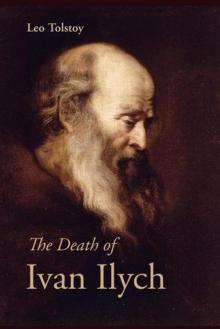 The Death of Ivan Ilych
The Death of Ivan Ilych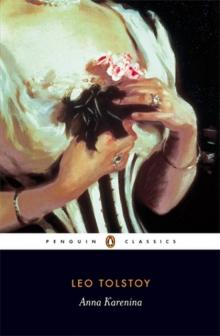 Anna Karenina
Anna Karenina Resurrection
Resurrection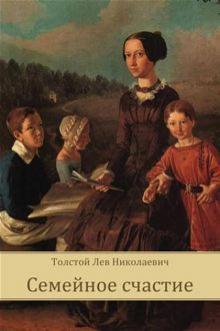 Family Happiness
Family Happiness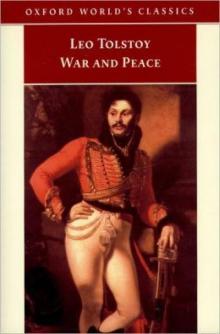 War and Peace
War and Peace The Cossacks
The Cossacks The Kreutzer Sonata
The Kreutzer Sonata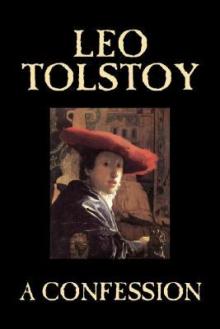 A Confession
A Confession The Kingdom of God Is Within You
The Kingdom of God Is Within You Father Sergius
Father Sergius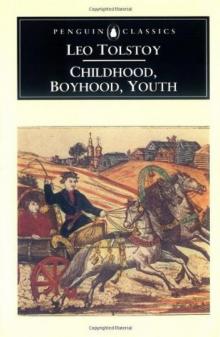 Childhood, Boyhood, Youth
Childhood, Boyhood, Youth Lives and Deaths
Lives and Deaths The Devil
The Devil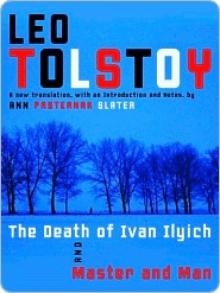 The Death of Ivan Ilyich and Master and Man
The Death of Ivan Ilyich and Master and Man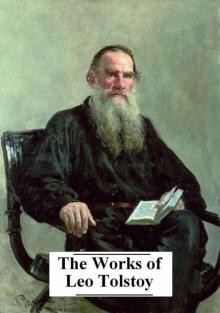 The Complete Works of Leo Tolstoy (25+ Works with active table of contents)
The Complete Works of Leo Tolstoy (25+ Works with active table of contents)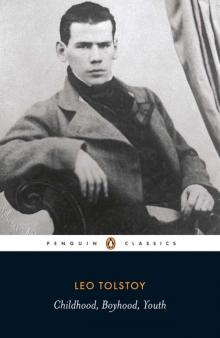 Childhood, Boyhood, Youth (Penguin ed.)
Childhood, Boyhood, Youth (Penguin ed.)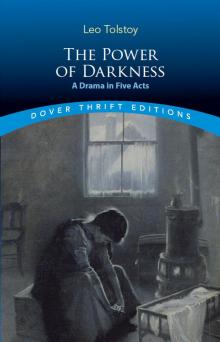 The Power of Darkness
The Power of Darkness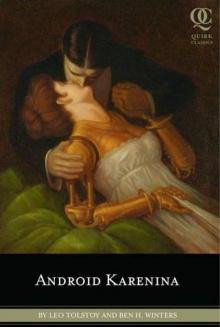 Android Karenina
Android Karenina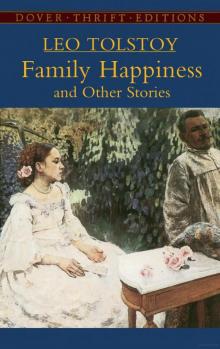 Family Happiness and Other Stories
Family Happiness and Other Stories The Lion and the Puppy
The Lion and the Puppy Collected Shorter Fiction, Volume 2
Collected Shorter Fiction, Volume 2 Collected Shorter Fiction, Volume 1
Collected Shorter Fiction, Volume 1